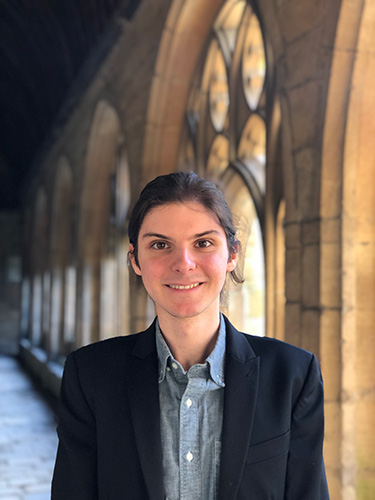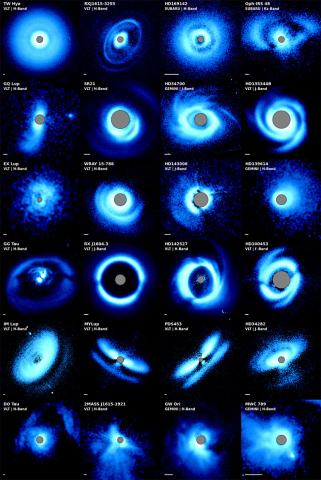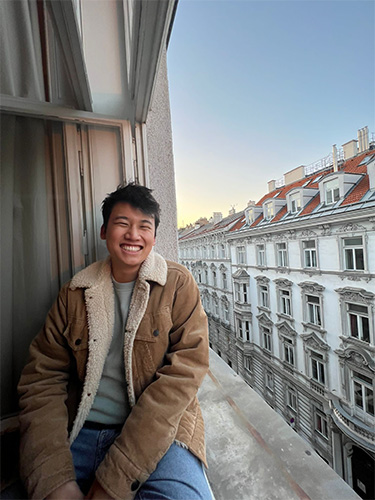The digits 413 are meaningful to everyone at Amherst—they’re the College’s area code. But 413 also happens to be the nationwide number of Goldwater Scholarship winners this year, and two Amherst students are among them. As outstanding STEM scholars, Alex DelFranco ’24 and Justin Su ’24E will receive financial support for the coming academic year from the Barry Goldwater Scholarship & Excellence in Education Foundation. Read on to find out about the projects they’ve already done and what they hope to do next.
News & Events Goldwater Scholars Explore the “Realm of the Unknown”
Alex DelFranco ’24

“As long as I can remember, I’ve really been interested in science, math and physics,” says Alex DelFranco ’24. In his Goldwater Scholarship application, he described his childhood in New York City, where, “on weekly trips to local libraries and museums, I would ask questions about the history of our universe—questions nobody I knew could ever answer.”
But it didn’t become clear to him that he wanted to devote his life to science until he took an introductory astrophysics course during his first semester as an Amherst student. “And my TA in that course was Jea Adams [’21], who was actually a Goldwater Scholar,” he says. Adams, a 2020 winner of the scholarship, became a mentor to DelFranco, who took over her teaching-assistant role in that course the following year. “She’s in grad school now at the Center for Astrophysics at Harvard. And I got to do a research project there over this last summer. I just did the same research she did her sophomore year. So I’ve been following in her footsteps, step for step, for the last couple of years.”
DelFranco’s project at the Harvard & Smithsonian Center for Astrophysics, in the lab of Harvard professor Karin Öberg with postdoctoral fellow Rafael Martín Doménech, involved using both direct telescopic imaging and laboratory experiments to learn about the molecular makeup of disks of dust that form planets around faraway stars. “Astrochemistry has really piqued my interest,” DelFranco says. “The fact that we can do chemistry in space is mind-blowing to me, still.”

(Click the image to see full size)
His work on this project continued remotely into his junior year, which he has spent studying abroad, taking advanced physics courses at the University of Oxford in England. In April, he traveled to Kyoto, Japan, for a conference called “Protostars and Planets VII,” at which he met up with two other mentors, Amherst’s Assistant Professor of Astronomy Kate Follette and Connor Robinson of the Five College astronomy program, to present findings from earlier research. An image that DelFranco produced while working with Follette during his first year at Amherst—showing a grid of different planet-forming disks in bright blue—was featured in several different talks and was chosen to appear on the cover of the conference’s publication.
DelFranco’s long-term goal is to earn a Ph.D. in astrophysics and teach undergraduates at a research institution. A founding member of Amherst’s Education Studies Club, he believes it’s important to “tap into that fundamental curiosity that kids have”—which he recalls in himself—and especially to open up opportunities in the sciences for young people from underresourced and underrepresented communities. His work with Pensos, a nonprofit that he co-founded in high school to offer teens classes in codebreaking, songwriting, entrepreneurship and more, made DelFranco a finalist for a Truman Scholarship this year.
In the shorter term, the Goldwater Scholarship is validating “that I’m on the right path, and that the work that I’ve been doing has been worthwhile, good work,” he says. It will support him in his final year at Amherst, during which he plans to complete a senior thesis in Follette’s lab—an extension of the thesis that his mentor Jea Adams did when she was a senior. DelFranco calls that “a poetic full circle.”
Justin Su ’24E

Winning a Goldwater Scholarship has been “very much a shared moment between me and my mentors,” says Justin Su ’24E. “It’s a testament to the strengths of their mentorship. I genuinely would not have won this without them.”
One of them is Associate Professor of Biology Jeeyon Jeong, with whom he has worked since his second semester at Amherst, not only as a student in several courses but as a teaching assistant and a researcher in her lab. “She’s been an incredible mentor, always willing to offer support, always willing to give her time,” he says, noting that they co-authored a paper together even during his “gap semester” when he was not enrolled at the College. Now Jeong is his adviser on a senior thesis about the epigenetic regulation of plant iron homeostasis.
Su’s other mentors include Professor Drew Weissman and Dr. Ted Kreider from the University of Pennsylvania’s Perelman School of Medicine, with whom he worked in the summer of 2022. The Weissman Lab “developed a technology behind the mRNA COVID vaccines,” Su says, “so it was an incredibly high-powered lab, and I joined at a time when they were receiving a lot of attention and funding.” Kreider guided him through research that applied the same technology toward expressing HIV antibodies. The experience helped inspire Su to set a goal “to become a physician-scientist researching infectious diseases, specifically HIV/AIDS, and novel therapeutics,” as he wrote in applying for the Goldwater Scholarship. “Dr. Kreider emailed the lab and my summer program’s directors at Penn 15 minutes after I won,” he says.
Su, who grew up in the Bay Area of California, has learned to consider science from many different angles. Having served as an EMT for Amherst College Emergency Medical Services and as a research assistant for a COVID-19 antibodies study at UC San Francisco, he has seen the clinical, patient-oriented side of medicine as well as the purely research-based side, and he plans to work at the interface of the two by earning both an M.D. and a Ph.D. in immunology.
At Amherst, Su majors in the Biochemistry & Biophysics Program and also in English, cultivating an awareness of “the ways language itself shapes logical thinking.” He cites physician/poet Rafael Campo ’87 in discussing the metaphors that people use to describe illness and the idea “that language not only harms, but also heals.”
Su is mindful even about the different timeframes of scientific study, appreciating both “coursework where everything is constricted to the timeline of a semester” and “what it means to think about a question over multiple years.” When he was 12 years old, he traveled to Burma—where his parents emigrated from, and where much of his family still lives—and spent two weeks engaging in a common rite of passage for Burmese boys: training as a monk at a Buddhist monastery. The meditation skills he learned there, he says, have served him well as a scientist, enabling him to remain attentive and open to new insights even through monotonous lab routines and repetition of failed experiments.
“When you’re meditating, you’re like, Why am I here? And you work at it for hours, days, weeks,” he says. “I think this is where science has a similar feeling, where you’re in this realm of the unknown, and you’re working at it for a long time, and these insights are quite rare. But when they do come, they’re quite powerful.”